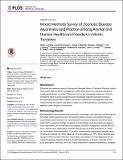Files in this item
Mixed methods survey of zoonotic disease awareness and practice among animal and human healthcare providers in Moshi, Tanzania
Item metadata
| dc.contributor.author | Zhang, H.L. | |
| dc.contributor.author | Mnzava, K.W. | |
| dc.contributor.author | Mitchell, S.T. | |
| dc.contributor.author | Melubo, M.L. | |
| dc.contributor.author | Kibona, T.J. | |
| dc.contributor.author | Cleaveland, S. | |
| dc.contributor.author | Kazwala, R.R. | |
| dc.contributor.author | Crump, J.A. | |
| dc.contributor.author | Sharp, Joanne P. | |
| dc.contributor.author | Halliday, J.E.B. | |
| dc.date.accessioned | 2019-07-04T15:30:02Z | |
| dc.date.available | 2019-07-04T15:30:02Z | |
| dc.date.issued | 2016-03-04 | |
| dc.identifier | 259466448 | |
| dc.identifier | e8943224-7bdf-42b0-9987-6e64f2570971 | |
| dc.identifier | 84962409021 | |
| dc.identifier.citation | Zhang , H L , Mnzava , K W , Mitchell , S T , Melubo , M L , Kibona , T J , Cleaveland , S , Kazwala , R R , Crump , J A , Sharp , J P & Halliday , J E B 2016 , ' Mixed methods survey of zoonotic disease awareness and practice among animal and human healthcare providers in Moshi, Tanzania ' , PLoS Neglected Tropical Diseases , vol. 10 , no. 3 , e0004476 . https://doi.org/10.1371/journal.pntd.0004476 | en |
| dc.identifier.issn | 1935-2735 | |
| dc.identifier.other | Bibtex: urn:9ff8fa067d841ae3bc0171ac842accaf | |
| dc.identifier.other | ORCID: /0000-0001-5805-4296/work/64698277 | |
| dc.identifier.uri | https://hdl.handle.net/10023/18043 | |
| dc.description | This work was supported by US National Institutes of Health-National (NIH) Science Foundation Ecology and Evolution of Infectious Disease program (R01 TW009237) and the UK Biotechnology and Biological Sciences Research Council (BBSRC) (BB/J010367). Additional support was provided by BBSRC grants BB/L018845 (RRK, JAC and JEBH) and BB/L018926 (SC, RRK, JPS and JAC). JAC is supported by NIH grant R01 TW009237 and Bill & Melinda Gates Foundation grant OPP1125993. JPS had additional support from an ESRC fellowship, RES-070-27-0039. HLZ received support from the Doris Duke Charitable Foundation through a grant supporting the Doris Duke International Clinical Research Fellows Program at Duke University. | en |
| dc.description.abstract | Background: Zoonoses are common causes of human and livestock illness in Tanzania. Previous studies have shown that brucellosis, leptospirosis, and Q fever account for a large proportion of human febrile illness in northern Tanzania, yet they are infrequently diagnosed. We conducted this study to assess awareness and knowledge regarding selected zoonoses among healthcare providers in Moshi, Tanzania; to determine what diagnostic and treatment protocols are utilized; and obtain insights into contextual factors contributing to the apparent under-diagnosis of zoonoses. Methodology/Results: We conducted a questionnaire about zoonoses knowledge, case reporting, and testing with 52 human health practitioners and 10 livestock health providers. Immediately following questionnaire administration, we conducted semi-structured interviews with 60 of these respondents, using the findings of a previous fever etiology study to prompt conversation. Sixty respondents (97%) had heard of brucellosis, 26 (42%) leptospirosis, and 20 (32%) Q fever. Animal sector respondents reported seeing cases of animal brucellosis (4), rabies (4), and anthrax (3) in the previous 12 months. Human sector respondents reported cases of human brucellosis (15, 29%), rabies (9, 18%) and anthrax (6, 12%). None reported leptospirosis or Q fever cases. Nineteen respondents were aware of a local diagnostic test for human brucellosis. Reports of tests for human leptospirosis or Q fever, or for any of the study pathogens in animals, were rare. Many respondents expressed awareness of malaria over-diagnosis and zoonoses under-diagnosis, and many identified low knowledge and testing capacity as reasons for zoonoses under-diagnosis. Conclusions: This study revealed differences in knowledge of different zoonoses and low case report frequencies of brucellosis, leptospirosis, and Q fever. There was a lack of known diagnostic services for leptospirosis and Q fever. These findings emphasize a need for improved diagnostic capacity alongside healthcare provider education and improved clinical guidelines for syndrome-based disease management to provoke diagnostic consideration of locally relevant zoonoses in the absence of laboratory confirmation. | |
| dc.format.extent | 18 | |
| dc.format.extent | 377256 | |
| dc.language.iso | eng | |
| dc.relation.ispartof | PLoS Neglected Tropical Diseases | en |
| dc.subject | RA0421 Public health. Hygiene. Preventive Medicine | en |
| dc.subject | DAS | en |
| dc.subject | SDG 3 - Good Health and Well-being | en |
| dc.subject.lcc | RA0421 | en |
| dc.title | Mixed methods survey of zoonotic disease awareness and practice among animal and human healthcare providers in Moshi, Tanzania | en |
| dc.type | Journal article | en |
| dc.contributor.institution | University of St Andrews. School of Geography & Sustainable Development | en |
| dc.identifier.doi | 10.1371/journal.pntd.0004476 | |
| dc.description.status | Peer reviewed | en |
This item appears in the following Collection(s)
Items in the St Andrews Research Repository are protected by copyright, with all rights reserved, unless otherwise indicated.

